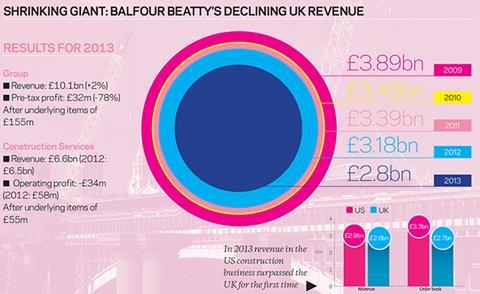Chief executive of Balfour Beatty Construction Services UK describes 2013 as a ‘disappointing’ year

Balfour Beatty expects its UK construction business to return to “gentle” growth this year after an “awful” 2013, when profit in the business fell £60m lower than expectations.
Speaking to ∫⁄∂¥…Á«¯ after Balfour Beatty published its results for the year to 31 December 2013, Nick Pollard, chief executive of Balfour Beatty Construction Services UK, described 2013 as a ‚Äúdisappointing‚Äù year, but insisted the business was on track to return to ‚Äúgentle‚Äù growth in 2014 and improved profitability.
In its results, Balfour Beatty’s global construction business posted revenue of £6.6bn, marginally up on £6.5bn last year – with revenue in the US (£2.9bn) overtaking revenue in the UK (£2.8bn) for the first time (see chart, right).
However, after taking into account £55m in restructuring and finance costs, the construction business posted an operating loss of £34m, down from an operating profit of £58m in 2012.
Before accounting for those costs, the firm posted an underlying operating profit of £21m, down 82% on £119m the previous year.
Last year we worked through the tail end of a number of jobs that were clearly bid too cheaply – at the wrong price
Nick Pollard
Balfour Beatty said the decline was “mostly due to the performance of the UK business”, where revenue tumbled 12% to £2.8bn, and profit fell £60m short of expectations – £10m more than the firm indicated in a profit warning last April.
Pollard said “all of” the additional £10m shortfall was because of underperformance in the firm’s M&E business Balfour Beatty Engineering Services, where “workloads are slower to pick up and the market is remaining incredibly tight”. He said he expected to see a pick-up in work in the M&E business this year.
He said the firm’s regional construction business - where the vast majority of the £50m profit shortfall announced last year was located - had begun to “turn around” on the back of the recovery in the housing market, with the firm picking up housing-related work, such as roads, utilities, sewers and small-scale retail schemes.
However, Pollard said the firm’s major projects business was taking longer to recover due to a lack of large-scale infrastructure schemes coming to market.
Last year Balfour Beatty predicted revenue in the UK construction business would fall 20% to £2.6bn in 2013 – down from £3.2bn in 2012 – with revenue then beginning to grow again by around 5% from 2014.

Pollard said the fact that revenue declined by 12% to £2.8bn, rather than the forecast 20%, showed the business had bid for too many jobs during the downturn.
He said: “Maybe it should have gone down [20%] and maybe the business shouldn’t have bid as hard or as tight or as low on some of the work that it did in the past.
“Last year we worked through the tail end of a number of jobs that were clearly bid too cheaply - at the wrong price.
“That has probably helped keep revenue up. Maybe the 20% forecast a year ago was where the business should have been.”
Pollard said he did expect revenue growth to return this year, but said it would be “very gentle” and that he expected only a “slight” improvement in margins.
“We’re righted and are on a good path. The first half was when we saw an awful performance. The performance in the second half of the year was significantly better than the first half.
“We’ve had a tough year, everybody knew it was a tough year, we’ve diagnosed what the problems were and we’ve been busy curing them.”
More trouble down under
The UK construction business is not the only area where Balfour Beatty has been having problems. The firm’s business in Australia has been hit by a downturn in the mining and resources sector, with the firm having to take out £70m in annual costs in 2013. The Australian business was loss making in 2013, but the firm expects it to break even this year.
Overall Balfour Beatty posted group revenue including share of joint ventures of £10.1bn in 2013, up 2% on 2012. But £155m in non-underlying costs dragged down the group’s pre-tax profit to £32m – a fall of 78% on the previous year.
The £155m costs included £52m for restructuring, with £20m related to the firm’s Australian business; £26m related to its UK businesses – including a further £14m related to the UK construction business on top of the £34m it incurred in 2012.
Before accounting for the £155m in costs, underlying pre-tax profit across the group stood at £187m, down 32% from £277m last year.


























No comments yet